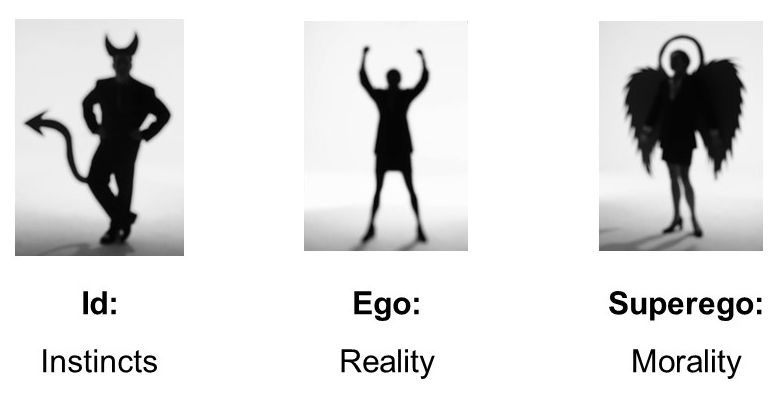This is not going to be a very specific or an inventive piece of work, afteral the real work of identifying this falling apple was long accomplished by Sigmund Feud in his paper The Ego and the Id.
We will rather have a look how this plays out in today’s life where Deception(Ego) is the major point of focus throughout our society.
What the philosophy is all about?
On a ground level Freud, broke our very existence into 3 basic entities:
- Id: the entity responsible for our basic instincts like needs, hunger, thirst, rest, greed and lust.
- Super Ego: the entity responsible for setting up moral grounds behind our behaviour like our tendency to attain perfection, conscience and kindness. Hence it has two parts
-
- Ideal Self: What should you ideally do (Bhagwad Gita)
- Conscience: What you feel is right to do (Ramayana/Bible)
-
- Ego: the driving entity that plays with Id and Super Ego to represent our existence in more acceptable manner so as to achieve a long term benefit in the society. Ego has an obligation to create a balance between the other two entities to maintain a sane mentality.
Now that we have briefly understood, where our mentor Freud took us there, lets check out how is it impacting us today in the age of Facebook, Twitter and Instagram.
Philosophical Duality
But before that share another analogy, for you – My Dear Reader, so that it would be easier for me set up the premise. Heard of Jekyll and Hyde, haven’t you?
Oh no!! Not Russel Crowe one from Mummy(2017).
I am talking about the original story of Jekyll and Hyde by R. L. Stevenson. So to give you an idea.
Dr. Jekyll was a person of great reputation, with a social obligation of acting in a good and morally acceptable manner, which led his Ego to suppress all the needs of his Id. So when he created a potion as a part of an experiment, incidentally that potion was too strong neurotically and led his Ego to lose control. This subsequently led the decades of suppressed Id to overcome his Super Ego and hence, Mr Hyde overtook Dr. Jekyll.
Now to a student of standard psychology, this is a simple case of Dissociative Identity. However, even before becoming a case of DID, it is an underlying concept of Philosophical Duality on the author’s end.
So basically Dualism is….
Dualism as a philosophy signifies the view that the universe contains two radically different kinds of being or substance-matter and spirit, body, and mind. The ancient Greeks distinguished profoundly the soul and the body as the dictum states: “The body is a tomb.” Evil therefore was a result of an infinite soul trapped in a finite body. Plato for instance was strongly dualistic in that he expressed the view that the soul exists independently of the body. The rational soul is a spiritual substance distinct from the body within which it dwells, much like the chariot and a charioteer.
Dualism served a great purpose in the European Renaissance when Descartes described the mind exclusively as a substance that thinks and matter exclusively as an extended substance. This dualism enabled a wholly mathematical science of physics to come about where every fact in the material world was to be explained on basis of measurements. In this scheme, the psyche is immeasurable and thus not open to either understanding or intervention.
Back to Jekyl and Hyde Again:
In the novel, Stevenson creates a hero who by way of a concoction (that he compares with alcohol in course of the novel) intervenes in his “normal” mental processes and unleashes Mr. Hyde. This new persona not only is pure evil but also has a countenance that suggests “Satan’s signature” and a body that is “something troglodytic”. Here, not only the psyche is shown as a process that can be mediated by external tangible methods (the mysterious concoction) but also that a change in the psyche is associated with a change in the body or the soma. Stevenson seems to eschew traditional mind–body dualism to a remarkably modern monistic way of looking at the mind–body functioning.
But how does this connect to the point of our article?
Dualism in Real World today:
Dualism though considered a philosophical topic is yet another foundational concept when we are discussing Super-Ego. Primary reason being the wide-existence of religion(any religion). Freud did argue that Super-Ego has less to do with religion and more to do with Parent’s Super-Ego, but come on, we all know how much our culture and religion and social norms effect our conscience.
Coming to our time now. I have always stated(even in one of my previous articles) that something changed as the generations changed. More specifically with the rise of the Millennials and the norms and luxury of technology they got we got more problems than solutions.
Quoting myself again here:
You see, social media targets on four major types of people. People can be based up things they like. You can see for yourself if they like:
- boasting their achievements
- faking their lives so as to portray a bigger lifestyle
- peeping in to their friend’s and frenemy’s lives
- connecting to masses for popularity and sharing messages
Guess what, we always lie in any one of these 4 types. And that is not even our fault. Our dear scientists proved years ago that humans are social animals and crave a social acceptance. Wasn’t this also one of the many principals in our need of petting wolves into dogs!!
So what does this bring us to?
We now face our own fears:
- Egocentrism: You know when you so often care only or more about yourself rather than others or even the society. Because it is not your problem any more. Somehow our Ego have been able to take the weightage of guilt away from the shoulders of our Super-Ego and has made our Id to be able to indulge in the methods of social ignorance.
- Narcissism: Yeah those moments when you become so full of yourself admiring how good you look or how good you work or how successful you are that you forget to empathise with the people around. You just want others to listen your problems and care for only you while you ignore them. Some generalised examples – school bullies, arrogant abusers, mis-users, or even desperate boy/girlfriends..
Like the id, the ego seeks pleasure too (i.e., tension reduction) and even avoids pain, but unlike the id, the ego is concerned with devising a realistic strategy to obtain pleasure. The ego has no concept of right or wrong; something is good simply if it achieves its end of satisfying without causing harm to itself or the id.
By the years of constant evolution in our social life we have somehow done opposite of what Dr. Jekyll did. Today our Ego is closer to Id. We are more ignorant and casual with respect to Super-Ego.
In a recent research around the effect of social media on our inner conscience, around 200 test subjects, age group 21-35 years, were selected based on their social life. 100 subjects were people with negligible social presence, belonging to rural regions while remaining 100 subjects were people with active social lives and constant digital tools users. These subjects were given psychometric tests and situation based problems to analyse the level empathy they might hold.
Apparently 84 people from group 2 provided more self-centred answers in contrast to the group 1 people, where only 15 people gave self-centred answers.
What can be further said. We are losing our Super-Ego to our Id.. Yet.. Its a funny story afteral..
 UtkarshSpeaks. – Blogs by Utkarsh Kaushik A learning shed for like minded readers.
UtkarshSpeaks. – Blogs by Utkarsh Kaushik A learning shed for like minded readers.








